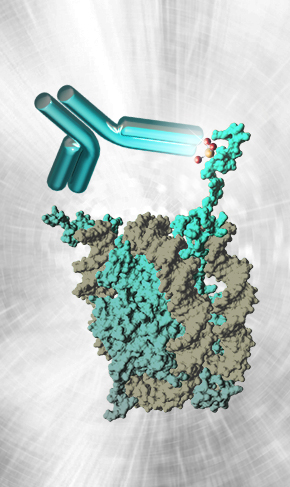We use cookies to make your experience better. To comply with the new e-Privacy directive, we need to ask for your consent to set the cookies. Learn more.

Background
Post-translational modifications or PTM are chemical modifications that play a key role in functional proteomics. PTM can be the covalent addition of functional groups on specific amino acids, proteolytic cleavage of regulatory subunits or degradation of entire proteins. Our scientists are specialised in both the post-translational modification and the peptide synthesis fields. Using this knowledge, we can provide a high quality service in order to develop specific antibodies against post-translational modifications using peptides modified in vitro.
Our very wide range of available modifications makes our offer one of the most complete. To discover the complete list, you can browse our peptide synthesis dedicated webpage.
Peptide Design
Thanks to our specific software and in-house expertise, we are able to design the most relevant peptide sequences to raise PTM-specific antibodies. Knowing the targeted modification of the protein, the sequence is chosen to optimise the immune response against the selected modification. To achieve this, we take into account:
- the immunogenicity of the amino acids sequences on both sides of the modification
- the presence of conserved patterns relative to the host species
The sequence we select is first submitted to your validation before starting the immunisation protocol.
Peptide Synthesis & Conjugation
To perform the development of an anti-PTM antibody, two peptides are synthesised based on the same sequence:
- 1 modified peptide as immunogen: up to 15 residues, 20-25 mg, 70% minimal purity
- 1 unmodified peptide as control: same sequence, 5-10 mg, 70% minimal purity
Like for anti-peptide antibody development, these characteristics are optimised for anti-PTM antibody development, but you can choose to synthesise peptides with higher length, quantity and/or purity.
Afterwards, a part of the modified peptide is conjugated to one of the available carrier proteins (see the peptide conjugation section). The remaining part will be used for the ELISA as well as for the purification procedure as described below.
Anti-PTM Polyclonal Antibody Development
Contrary to anti-protein or anti-peptide ones for which additional services are optional, the development of anti-PTM antibodies automatically includes:
- an ELISA monitoring to ensure that the immune response is directed against the modified peptide and not the control one,
- a specific purification procedure to discard the remaining control peptide-specific antibodies.

